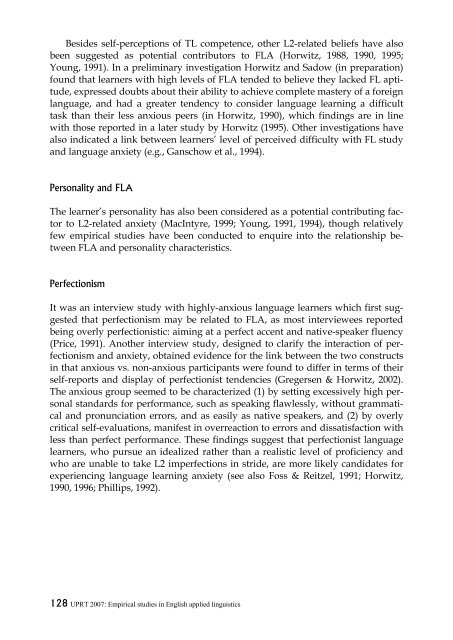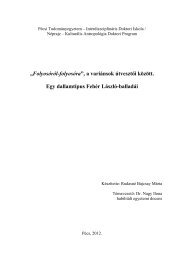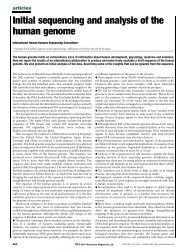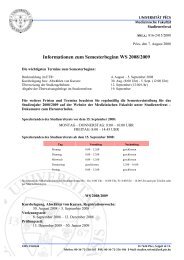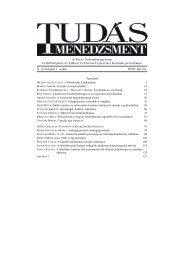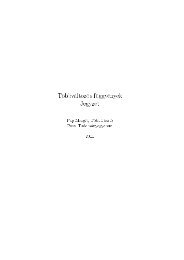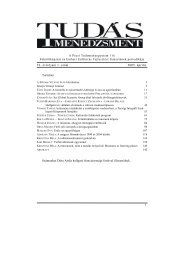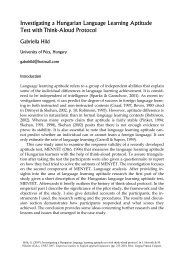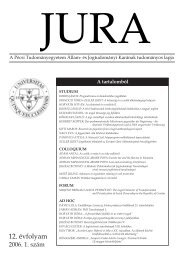Besides self-perceptions <strong>of</strong> TL competence, o<strong>the</strong>r L2-related beliefs have alsobeen suggested as potential contributors to FLA (Horwitz, 1988, 1990, 1995;Young, 1991). In a preliminary investigation Horwitz and Sadow (in preparation)found that learners with high levels <strong>of</strong> FLA tended to believe <strong>the</strong>y lacked FL aptitude,expressed doubts about <strong>the</strong>ir ability to achieve complete mastery <strong>of</strong> a foreignlanguage, and had a greater tendency to consider language learning a difficulttask than <strong>the</strong>ir less anxious peers (in Horwitz, 1990), which findings are in linewith those reported in a later study by Horwitz (1995). O<strong>the</strong>r investigations havealso indicated a link between learners’ level <strong>of</strong> perceived difficulty with FL studyand language anxiety (e.g., Ganschow et al., 1994).Personality and FLAThe learner’s personality has also been considered as a potential contributing factorto L2-related anxiety (MacIntyre, 1999; Young, 1991, 1994), though relativelyfew empirical studies have been conducted to enquire into <strong>the</strong> relationship betweenFLA and personality characteristics.PerfectionismIt was an interview study with highly-anxious language learners which first suggestedthat perfectionism may be related to FLA, as most interviewees reportedbeing overly perfectionistic: aiming at a perfect accent and native-speaker fluency(Price, 1991). Ano<strong>the</strong>r interview study, designed to clarify <strong>the</strong> interaction <strong>of</strong> perfectionismand anxiety, obtained evidence for <strong>the</strong> link between <strong>the</strong> two constructsin that anxious vs. non-anxious participants were found to differ in terms <strong>of</strong> <strong>the</strong>irself-reports and display <strong>of</strong> perfectionist tendencies (Gregersen & Horwitz, 2002).The anxious group seemed to be characterized (1) by setting excessively high personalstandards for performance, such as speaking flawlessly, without grammaticaland pronunciation errors, and as easily as native speakers, and (2) by overlycritical self-evaluations, manifest in overreaction to errors and dissatisfaction withless than perfect performance. These findings suggest that perfectionist languagelearners, who pursue an idealized ra<strong>the</strong>r than a realistic level <strong>of</strong> pr<strong>of</strong>iciency andwho are unable to take L2 imperfections in stride, are more likely candidates forexperiencing language learning anxiety (see also Foss & Reitzel, 1991; Horwitz,1990, 1996; Phillips, 1992).128 UPRT 2007: Empirical studies in English applied linguistics
CompetitivenessThe idea that language anxiety may also stem from ano<strong>the</strong>r personal trait, competitiveness,comes from an <strong>of</strong>t-cited diary study (Bailey, 1983). Bailey (1983, p. 96)defines competitiveness as a learner’s “desire to excel in comparison to o<strong>the</strong>rs”,which may manifest itself in learner characteristics such as: (1) overtly comparingoneself to classmates and personal expectations, (2) a feeling <strong>of</strong> having to outdoo<strong>the</strong>r learners, (3) and a preoccupation with tests and grades, especially with referenceto o<strong>the</strong>r students. According to Bailey’s hypo<strong>the</strong>sis, anxiety results whencompetitive learners perceive <strong>the</strong>mselves as less competent compared to o<strong>the</strong>rs,that is, when <strong>the</strong>y feel unable to compete.Since evidence for <strong>the</strong> relationship between anxiety and both perfectionismand competitiveness has been cited from qualitative studies involving a smallnumber <strong>of</strong> learners (eight in Gregersen & Horwitz, 2002, and ten in Price, 1991 andBailey, 1983), quantitative inquiries, using larger samples <strong>of</strong> language learners areneeded to verify <strong>the</strong> findings <strong>of</strong> <strong>the</strong>se small-scale investigations.Statement <strong>of</strong> purposeAs <strong>the</strong> review shows, current assumptions about how FLA is related to <strong>the</strong> selectedlearner variables are based on <strong>the</strong> results <strong>of</strong> studies investigating <strong>the</strong> relationship<strong>of</strong> a given variable to FLA in isolation (as in <strong>the</strong> case <strong>of</strong> pr<strong>of</strong>iciency, FLaptitude, motivation, L2-related self-perceptions), or on <strong>the</strong> findings <strong>of</strong> qualitativeinquiries with a small number <strong>of</strong> participants (competitiveness and perfectionism).The aim <strong>of</strong> this study is to test <strong>the</strong>se assumptions, examining all <strong>the</strong>se learner variablesas potential predictors <strong>of</strong> FLA toge<strong>the</strong>r in <strong>the</strong> same sample <strong>of</strong> learners: firstyear English majors from <strong>the</strong> same university. The research questions <strong>of</strong> <strong>the</strong> studyare as follows:What is <strong>the</strong> strength and direction <strong>of</strong> <strong>the</strong> relationship between each <strong>of</strong> <strong>the</strong> selectedlearner variables – pr<strong>of</strong>iciency level, FL aptitude, strength <strong>of</strong> motivation, L2self-concept, perfectionism, and competitiveness – and participants’ feelings <strong>of</strong>FLA? What relative contribution do <strong>the</strong> same variables make to <strong>the</strong> prediction <strong>of</strong>FLA?MethodParticipantsThe study was conducted at <strong>the</strong> School <strong>of</strong> English Studies <strong>of</strong> Pázmány PéterCatholic University (PPCU). The participants were English major students in <strong>the</strong>irfirst year <strong>of</strong> study (N = 107). The majority <strong>of</strong> <strong>the</strong>se students were women, with amale-female ratio <strong>of</strong> 24: 83. Their ages ranged from 18 to 24, with an average age<strong>of</strong> 19.37 (SD = 1.17). They had studied English for an average <strong>of</strong> 8.41 years (SD =2.66), with a minimum <strong>of</strong> 3 and a maximum <strong>of</strong> 14 years.Tóth, Zs. <strong>Predictors</strong> <strong>of</strong> foreign-language anxiety 129


